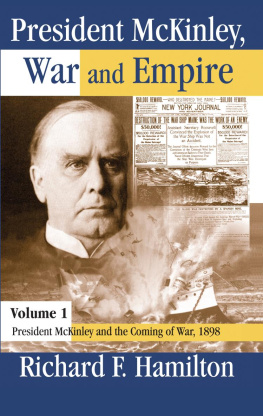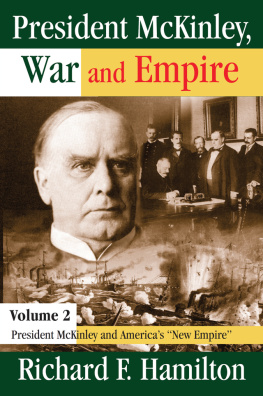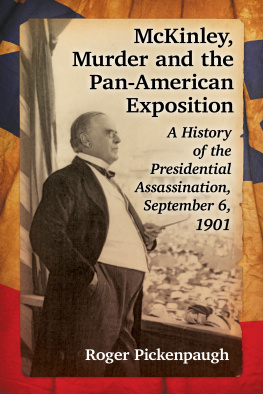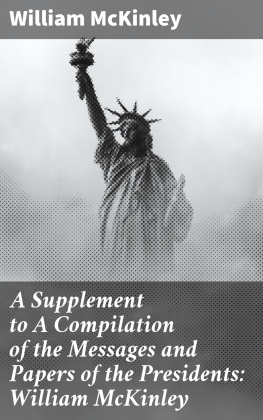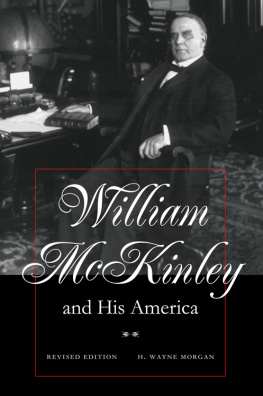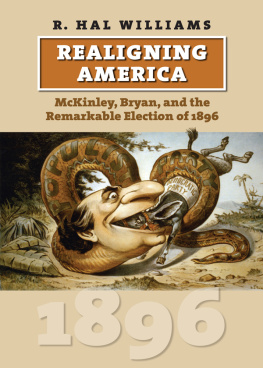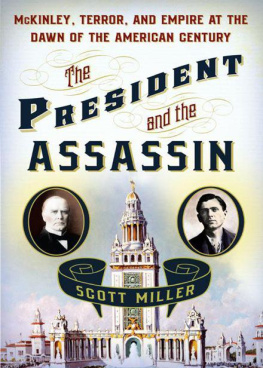President McKindley, War and Empire
American Presidents Series
Alexander Hamilton and the Growth of the New Nation
John C. Miller
With a new introduction by A. Owen Aldridge
Conversations with Lincoln
Compiled, edited, and annotated by Charles M. Segal
With a new preface by the editor and an introduction by David Donald
Eisenhower and the American Crusades
Herbert S. Parmet
George Bush: The Life of a Lone Star Yankee
Herbert S. Parmet
Herbert H. Humphrey: The Politics of Joy
Charles L. Garrettson III
The Illusions of a Conservative Reagan Revolution
Larry M. Schwab
President McKinley, War and Empire
Richard F. Hamilton
President Roosevelt and the Coming of the War, 1941: Appearances and Realities
Charles A. Beard
With a new introduction by Campbell Craig
Thomas Jefferson: Americas Philosopher-King
Max Lerner
With an introduction by Robert Schmuhl
Woodrow Wilson: A Psychological Study
William Bullitt and Sigmund Freud
President McKindley, War and Empire
Volume 1
President McKindley and the Comming of War, 1898
Richard F. Hamilton
First published 2006 by Transaction Publishers
Published 2017 by Routledge
2 Park Square, Milton Park, Abingdon, Oxon OX14 4RN
711 Third Avenue, New York, NY 10017, USA
Routledge is an imprint of the Taylor & Francis Group, an informa business
Copyright 2006 by Taylor & Francis.
All rights reserved. No part of this book may be reprinted or reproduced or utilised in any form or by any electronic, mechanical, or other means, now known or hereafter invented, including photocopying and recording, or in any information storage or retrieval system, without permission in writing from the publishers.
Notice:
Product or corporate names may be trademarks or registered trademarks, and are used only for identification and explanation without intent to infringe.
Library of Congress Catalog Number: 2005056879
Library of Congress Cataloging-in-Publication Data
Hamilton, Richard F.
President McKinley, war and empire / Richard F. Hamilton.
p. cm.(American presidents series)
Includes bibliographical references and index.
Contents: v. 1. President McKinley and the coming of war, 1898.
ISBN 0-7658-0329-1 (cloth : acid-free paper)
1. Spanish-American War, 1898Causes. 2. United StatesPolitics and government1897-1901. 3. McKinley, William, 1843-1901. 4. United StatesTerritorial expansion. I. Title. II. Series.
E721.H36 2006
973.8'9dc22
2005056879
ISBN 13: 978-0-7658-0329-0 (hbk)
Contents
In the mid-nineties, I was working on a book that was entitled The Major Social Theories. But as it was getting much too large, I divided it into two volumes, the first of which would review Marxism, Marxist revisionism, and Leninisms focus on imperialism. That volume also grew enormously, with the result that I dropped one of the chapters, Imperialism: The United States Experience. I had also written on some American presidents in the post Civil War era, mostly sketches and rough drafts. My thought at the time was to combine these somehow in a book focused on the Spanish-American War and the beginnings of the American Empire. After a digression for a large and complex volume dealing with the origins of World War I, I returned to work on this volume. The first result of this new effort was a long chapter entitled Presidents, Bosses, and Businessmen: 1868-1896. That too had reached impressive size and I had not yet discussed Presidents Arthur, Cleveland, and Harrison. It occurred to me that it would be best to drop that chapter.
Several more years of work resulted in a 600-page manuscript (with some 200 pages of notes) entitled President McKinley, War, and Empire. I then realized that a division would be appropriate and useful. This volume, the first of two, deals with the origin of the war. The second, still to come, will deal with the outcome, with Americas acquisition of a New Empire.
This work has been supported by the Mershon Center at the Ohio State University. I wish to thank Richard Herrmann, the Centers director, and Mershons superb staff, most especially Beth Russell, for their support and assistance.
Three good friends, William H. Form, David Trask, and Henry A. Turner, deserve special commendation. They have read and commented on all of the chapters, in some instances doing so for several versions. For all three, I wish to award a summa cum laude. My thanks also to various friends and associates who have provided generously of their time and wisdomto Edward Bell, Michael Les Benedict, Paul Beck, G. William Domhoff, Hal Durian, Richard Gunther, Peter Hahn, John Higley, Austin Kerr, John H. Kessel, Richard Ned Lebow, Frederick Milford, Carman Miller, Randolph Roth, David Stebenne, and Herbert Weisberg.
Once again, the many contributions of Irene Hamilton are gratefully acknowledged.
Several sources have been used with great frequency in the following pages. To simplify their citation, some abbreviations will be used throughout. There are:
Biographical sources:
Dumas Malone, ed., Dictionary of American Biography (New York, 1946 [1934]). Abbreviated as DAB, followed by the volume and page numbers, e.g., for John Jacob Astor, we would have DAB, 1:397399.
John A. Garraty and Mark C. Carnes, eds., American National Biography (New York, 1999). Abbreviated as ANB, the listing for Astor, for example, will be ANB, 1:696699.
In addition, four leading American history textbooks have been cited at many places. They are:
Robert A. Divine, T. H. Breen, George M. Fredrickson, and R. Hal Williams, America Past and Present, Vol. 2, fifth edition (New York, 1999).
James A. Henretta, David Brody, Susan Ware, and Marilynn S. Johnson, Americas History, Vol. 2, fourth edition (Boston, 2000).
Gary B. Nash, Julie Roy Jeffrey, John R. Howe, Peter J. Frederick, Allen F. Davis, and Allan M. Winkler, The American People, Vol. 2, fifth edition (New York, 2001).
Mary Beth Norton, David M. Katzman, Paul D. Escott, Howard P. Chudacoff, Thomas G. Paterson, and William M. Tuttle, Jr., A People and a Nation, fifth edition (Boston, 1998).
These will be abbreviated throughout as Divine et al., Henretta et al., and so forth.
Why do the nations so furiously rage together? Or, put simply, why war? It is an ancient question. An easy formal answer would be that a nations leaders chose war, seeing it somehow as their best or most appropriate option. To understand such choices, one must address two questions: Which individuals or groups made the decision? and, What were their motives?
In authoritarian regimes, the decision-makers are easily discerned. In 1740, for example, Frederick, the King of Prussia, chose to invade Silesia, then a part of the Austrian empire. Empress Maria Theresa responded in kind, deciding to meet war with war. Fredericks motivation might best be described as territorial aggrandizement. In this case, a twenty-eight-year-old monarch, one who had only recently gained the throne, took his nation to war.
Decisions for war made by individuals, the pure case, seems unlikely. One can easily imagine some larger group, the rulers advisors, civilian and military, providing some direction or at least offering guidance. In 1914, the first decisions for war were taken by three authoritarian regimes: Austria-Hungary, Russia, and Germany. In all three states, the decision was the work of a small coterie, less than a dozen persons.

